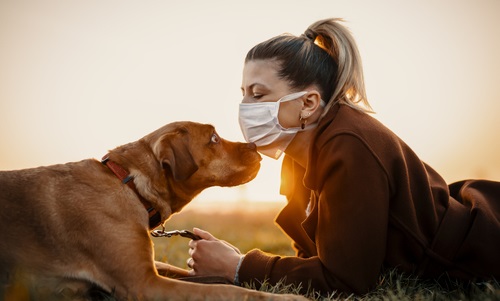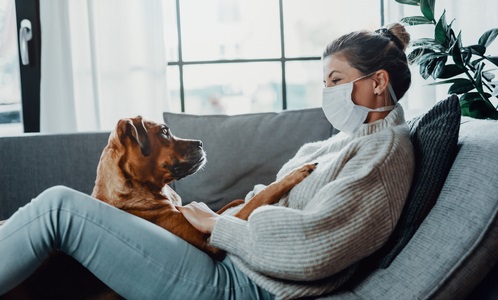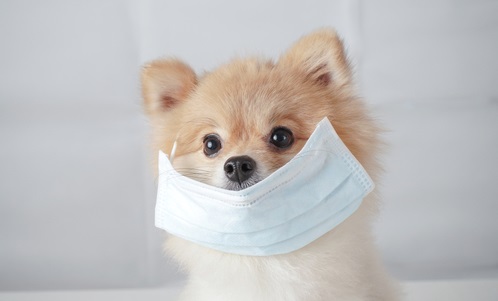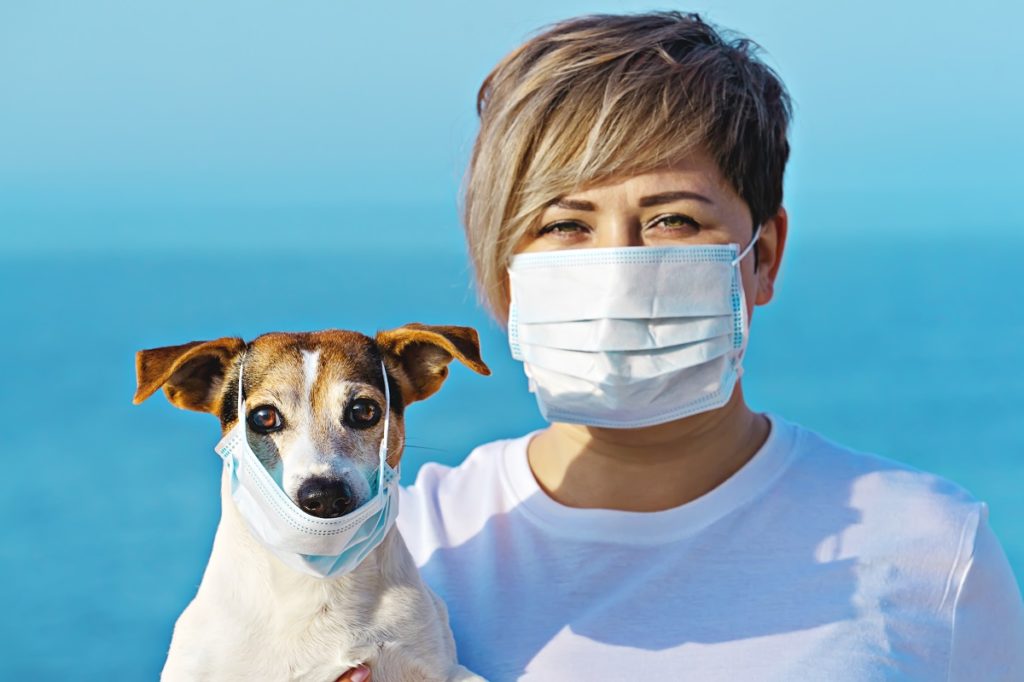In a time of firsts for the majority of the world’s population, the COVID-19 pandemic raises many questions – including “can pets get the coronavirus?” While there is still no human vaccine for this aggressive virus, scientists and the medical community at large continue to search for answers in regard to getting transmission under control. In addition to self-quarantining, getting tested for the virus remains a key goal across the nation in an effort to slow the spread of this potentially fatal illness. However, there has been concern that animals – specifically domestic pets like cats and dogs – might be capable of spreading the virus. This article will address the COVID-19 pandemic and how it affects household pets, highlighting important information that every pet parent should know.
Can Pets Get Coronavirus From Humans: Understanding Transmission Between Animals & Humans
In order to have a better understanding of how the transmission of COVID-19 occurs not only between humans and pets, but between animals, it’s important to look to scientifically-backed research for information and guidelines. According to the World Health Organization (WHO), “based on current evidence, human-to-human transmission remains the main driver” of the COVID-19 pandemic, noting that “further evidence is needed to understand if animals and pets can spread the disease.” In addition, the Centers for Disease Control and Prevention (CDC) states, “there is no evidence that pets can spread COVID-19 to people” and “there is no reason to think that any animals or pets in the United States might be a source of infection with this novel coronavirus.”
More simply put, while there is no conclusive evidence that says it’s impossible to get infected from a dog or cat infected with the coronavirus, most research is suggesting that this is highly unlikely. It should also be noted that there are no reported cases of humans catching COVID-19 from household pets or other animals. Below, several commonly-asked questions about if (and how) COVID-19 affects pets:

Q: Can my pet become infected with the coronavirus?
A: It’s no secret that animals and humans share a number of diseases – and unfortunately, COVID-19 is one of them. Domestic cats and dogs can become infected with the coronavirus, and the majority of the research points to pets (primarily cats) who tested positive were infected by owners who were affected by the virus. While some of the data was reported from real-world cases spanning the globe, other data was derived from laboratory testing and experiments involving cats and dogs. For example, researchers in Wuhan, China tested 102 cats; fifteen of those cats tested positive for the presence of antibodies to the virus in their system – meaning the felines had prior exposure to COVID-19. In this particular study, the cats who were tested came from several sources: either from veterinary hospitals, from cat owners who were sick themselves with the coronavirus, and stray cats.
Here’s where the evidence gets a bit murky: while three of the infected cats were owned by patients with the coronavirus (which accounts for exposure for those cats), it is indeterminate how the other 12 cats were infected with COVID-19.
In summary: according to studies, it is highly unlikely that a cat can pass on COVID-19 to owners – in fact, if a feline is infected, the chances are the cat caught it from its owner. It should also be noted that research has indicated that dogs are much more resistant to the coronavirus and unable to transmit the disease to other animals, whereas cats are not only more prone to illness, but capable of transferring the virus through the air to other cats.
Q: Can my cat or dog spread COVID-19 to other animals?
A: As the spread of coronavirus continues to pose a challenge, many people – particularly pet owners – are wondering if cats or dogs are capable of spreading the virus to other animals. In order to slow the pandemic, obtaining this information is crucial to both worldwide health agencies and the general public. Consequently, a group of scientists in China conducted targeted research to answer these pressing questions. By inoculating cats and dogs in a controlled setting, they were able to determine that SARS-CoV-2 (coronavirus) can replicate in felines and make them sick. In addition, it also indicated that cats are capable of transferring the virus to other cats. This research group also studied dogs, who were found to be far more resistant to COVID-19; the evidence also indicated that canines are unable to transmit the virus to other animals. Although this study provides crucial information, it is important to note that the results are unnatural, since the testing was done in a controlled laboratory setting versus the real world; therefore, it’s uncertain how natural transmission would actually occur.
In summary: While this controlled study indicates that dogs and cats are not completely immune to COVID-19, the lack of a pandemic among domestic pets offers some clear evidence that they are, in general, more resistant than their human counterparts.
Q: Is it safe to pet my cat or dog?
A: With so much uncertainty surrounding day-to-day activities, it’s no wonder people are questioning whether or not it’s safe to pet the family dog or cat. However, according to the American Veterinary Medical Association, petting your pooch’s fur is a low risk. Explains AVMA’s Chief Veterinary Office Gail Golab, “We’re not overly concerned about people contracting COVID-19 through contact with dogs and cats.” Fortunately there’s scientific evidence to back that statement, as Golab added, “The virus survives best on smooth surfaces, such as countertops and doorknobs…porous materials, such as pet fur, tend to absorb and trap pathogens, making it harder to contract them through touch.” In addition, the American Kennel Club’s Chief Veterinary Officer Dr. Jerry Klein explains that using common sense and taking precautions when it comes to pet care is vital: “If you have children, you wouldn’t have them touch a puppy and put their fingers in their mouth, because they can have fecal contamination…the general practice of washing our hands after touching a puppy or a dog – that’s normal hygiene.”

Q: Is it necessary to change my dog’s routine or keep my cat indoors?
A: The majority of research indicates that the chances of pets contracting COVID-19 from another animal are fairly low. However, it’s wise to use common sense and follow safe protocols, such as practicing social distancing with your pets when out in a public setting (e.g., taking your dog for a walk) – in fact, pet owners should follow the same rules for cats and dogs and keep household pets away from other animals and humans.
Here are a few additional guidelines to keep people and pets as safe and healthy as possible:
- Isolate from pets if sick with COVID-19: In the unfortunate event that a pet owner becomes infected with the coronavirus (either confirmed by a test or suspected), it’s important that they isolate themselves from their fur baby and have someone else take care of them during recovery. If that’s not feasible, the CDC recommends washing hands frequently and refrain from touching your face. The sick individual should also avoid contact with their pet – this includes petting, being kissed or licked, snuggling, and sharing bedding/food. For COVID-19 patients that must care for pets or be around animals, the CDC also advises wearing a cloth face covering and washing hands before & after interacting with animals. Furthermore, if a pet requires medical care, be certain to inform the family vet if you or a household member is sick with coronavirus. Providing this information to veterinary clinics during shelter in place is essential, since it will allow the vet to take the necessary precautions on their end.
- Maintain a healthy distance: The CDC also recommends that pet owners should prevent their pets from interacting with humans or other animals outside the immediate household. In addition, cats should be kept indoors when possible to help prevent them from interacting with other humans or animals. In addition, dog owners need to maintain at least a 6 – 8 foot distance from other people and animals during walks. In addition, the CDC also recommends that dog owners should avoid dog parks or any public places where large crowds of people and dogs gather.
There is a misconception that if a dog approaches a human, that person could contract the virus from a dog’s fur. However, the main reason anyone should avoid approaching dogs on a leash isn’t because of the animal, but the person on the other end of the leash. There is a much greater incidence of contracting COVID-19 from another human vs a dog or cat, so practice the six-foot rule when keeping your dog active during this pandemic.
Looking Ahead With COVID-19 & Your Pets: Stay Informed, Stay Safe
As of April 22, 2020, The U.S. Centers for Disease Control and Prevention (CDC) announced the first confirmed cases of SARS-CoV-2 (the virus that causes coronavirus) infection in two pet cats in two separate areas of New York state. These are the first pets in the United States to test positive for the virus. And although the evidence surrounding domestic pets and the coronavirus is changing constantly, scientific research has shown that on the whole, there is not enough evidence to worry with regard to your cat or dog. In some rare instances, pets may become infected with COVID-19; however, the chances of them becoming infected / getting sick from the virus – or passing it onto an owner or another animal – is very low.

Another important item to note: although there may be additional animals who test positive as infections continue in humans, people should be aware that such animal testing does not reduce the availability of COVID-19 tests for humans.
Finally, it’s crucial for pet owners everywhere to stay informed and stay proactive when it comes to providing the best possible care for pets during this health crisis. For anyone who absolutely must go out in public – whether it’s shopping for groceries or running essential errands in the neighborhood – be sure to keep a safe distance from people outside of your immediate household whenever physically possible. The best thing everyone can do to ensure the safety of humans and pets alike: stay home.
Sources Cited:
1) “Coronavirus And Pets: FAQs For Owners.” College Of Veterinary Medicine / University Of Illinois At Urbana-Champaign (vetmed.illinois.edu), April 22, 2020, https://vetmed.illinois.edu/pet_column/coronavirus-pets/. Accessed April 22, 2020.
2) O’Connor, Annette; Sargeant, Jan; Totton, Sarah; republished from The Conversation.com. “Can Pets Get The Coronavirus, And Can We Catch It From Them? Here’s The Science.” Science Alert.com, April 20, 2020, https://www.sciencealert.com/can-you-catch-covid-19-from-your-pets-here-s-the-science. Accessed April 22, 2020.
3) AKC Staff. “Can Dogs Get Coronavirus?” American Kennel Club (AKC.org), April 22, 2020, https://www.akc.org/expert-advice/news/can-dogs-get-coronavirus/. Accessed April 22, 2020.




